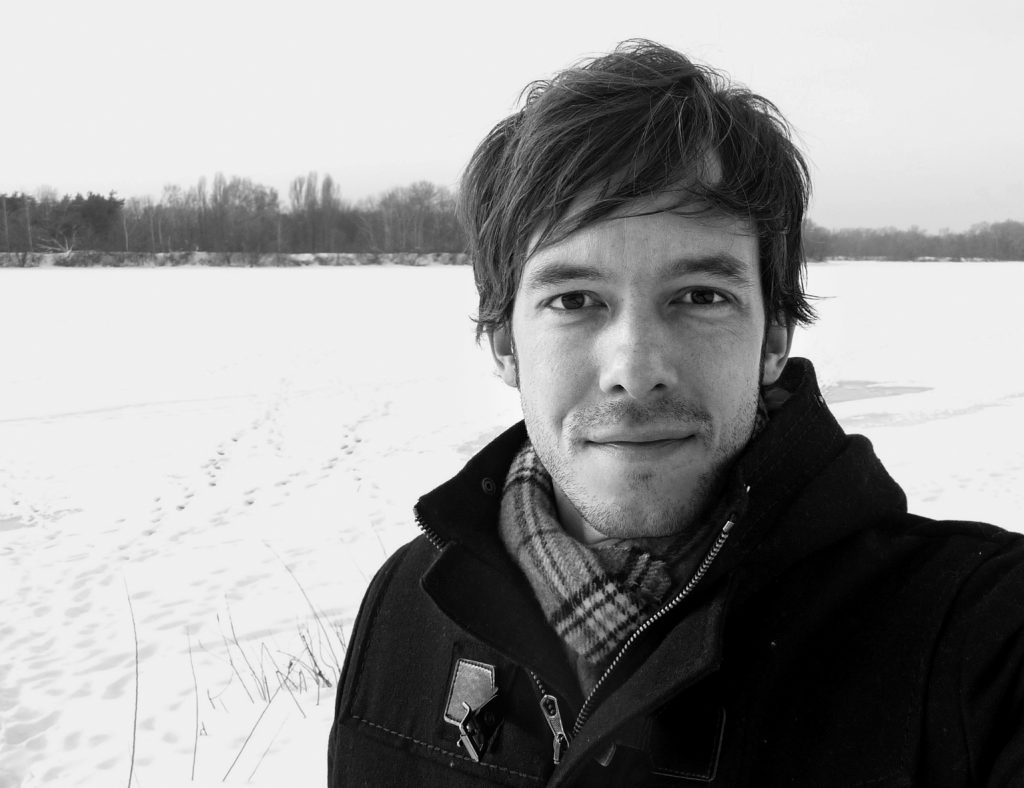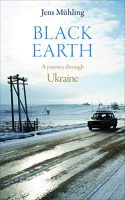March 10, 2020
In his latest book, ‘Black Earth’, the German journalist JENS MÜHLING travels through Ukraine from the Polish border to the Russian border. Along the way, he talks to nationalists and old communists, Crimean Tatars and Cossacks, smugglers, archaeologists and soldiers, gathering stories ‘of life and of grief and of love’. Here he explains what set him on his journey
 Jens Mühling, who says that on his first trip to Kiev he thought of Ukraine as ‘a sort of Russian suburb’
Jens Mühling, who says that on his first trip to Kiev he thought of Ukraine as ‘a sort of Russian suburb’
A QUESTIONING LOOK at the Przemyśl bus station, accompanied by words whose meaning I can only guess; I do not speak Polish.
I reply in Russian, accompanied by gestures pointing east: that way, across the border, to Ukraine.
The man, standing idly beside the bus, nods with a knowing expression, as if he understood more than I have said. He is fat and sweaty and no longer young, his eyes are blurred behind streaky glasses, it is a blazing hot day in late summer. I do not know what he wants from me. At first I mistook him for the bus driver, but he showed no interest in the ticket I held out for him. Apparently, he just wants to talk, and, paradoxically, the fact that I do not speak his language seems to make me the most qualified listener. The less someone understands, the more there is to explain.
I have stashed my backpack on the bus, which is set to depart for Ukraine in a few minutes. The man fills the time with a monologue in which I can only make out Polish sibilants and historical references: Franz-Josef… Hitler… Stalin… Cossacks… Ukraine… Tsar… Napoleon… Moscow… Kremlin… Lemberg… Catholic… Orthodox…
As he speaks, he punctures the air between our faces with his forefinger. He directs my gaze to the old Polish fortress rising in the distance above the roofs of Przemyśl. The next moment he urgently points at church towers and then at things that are hidden from my view, which seem to connect the past in his mind with the present before our eyes. I nod, smile, follow his pointing finger, without understanding much.
When the bus finally departs, the man remains at the station, as idle as before. As I watch his corpulent silhouette fading in the distance, I wonder what force of nature makes some people so obsessed with the past, and whether I attract such people because they sense I am looking for history, looking for stories.
Hardware stores, garden centres, tyre depots and spare-parts dealers slip past the bus windows. Between commercial buildings and parking lots, Poland comes to an end. Further on, not far away now, lies the western part of a country in whose east there is war. A war that is being waged about the past, or so it has seemed to me as I have followed the course of events in recent months. Often the mutual battle cry sounded to my ears like the monologue of the man at the bus station, a history-obsessed crescendo of Slavic sibilants and historical reproaches: Lenin!… Bandera!… Holodomor!… Holocaust!… Gulag!… Galicia!… Communists!… Fascists!… Imperialists!…
From the distance, I felt I could not understand much. It was this feeling that has set me on my journey.
I DO NOT REMEMBER when I first heard about Ukraine. There must have been a first time, as with any other country, but I have forgotten it, and now, as my bus approaches the border, this gap in my memory suddenly seems significant to me.
As a child, I traced the outlines of the Soviet Union on the world map with my forefinger, fascinated by its monstrous proportions. A sixth of the earth was shaded olive- green; no other country was that large — not even close.
When the Soviet Union disappeared from the map, Russia remained, not substantially smaller than before, still taking up more space on the globe than some continents. The rest of the former Union was eclipsed by the shadow of this Russian giant. As a teenager, I hardly took note of all the other independent states that had suddenly appeared on the map, also because they had not figured in the geography lessons of my childhood, not even as Soviet republics. There were other, much more distant countries that I otherwise knew nothing about, but at least they had stuck in my memory for their capitals’ sonorous names, such as Kuala Lumpur, or Ouagadougou. Others had left an impression on me because their flags looked convincing, or botched. With others still, I associated rivers, writers, car marques or just the vague feeling that people had more adventurous lives there.
But I knew nothing of the kind about the new countries on Russia’s borders. Strictly speaking, I knew even less than nothing, because after the Soviet breakdown I had instinctively reorganised my inner map, shifting everything that I had previously placed within the Soviet Union’s borders into Russia. Chernobyl, Gogol, Brezhnev, Borscht, Crimea — all Russian, I thought.
All Ukrainian, as I was to learn later.
But even during my first visit to Kiev, a decade before my current trip, I conceived of Ukraine as a sort of Russian suburb, although I quickly realized that its inhabitants did not want to be regarded in that way. From Moscow, where I was working as a journalist at the time, I had crossed the Russian-Ukrainian border. Beyond it, my train travelled past prefabricated concrete buildings that looked just like the prefabricated concrete buildings before the border. The trains were the same, the buses, the kiosks. The men wore the same dark leather jackets, the women’s heels were just as high. Even their language seemed the same: everywhere I heard only Russian.
Only five years later did I consciously register my first Ukrainian sentences. This happened at the Darnytsa market, a collection of meat and vegetable stalls in a Kiev suburb comprised of concrete buildings. Around the perimeter of the market grounds, old women flanked the sidewalks, their chequered oil-cloth bags full of fruit harvested from the dachas of the surrounding villages and transported to Kiev to sell to the city-dwellers. When I spoke to them in Russian, they usually shifted into Ukrainian after the first two exchanges, apparently without realising it. When I asked questions, because I had understood most, but not all, words of the similar-sounding language, they immediately switched back to Russian, unconsciously slipping back into Ukrainian again after the next two sentences. “Sunshine, it’s all the same for us,” they said apologetically when I asked questions again.
“They speak surzhik,” my Kiev friends said of the market women. They turned up their noses at this mixture of Russian and Ukrainian, which you would never hear coming out of the mouths of the city’s more educated residents. I, on the other hand, was fascinated by the idea that two languages did not have to be clearly demarcated, that they could blend seamlessly. It was a type of bilingualism I had not come across in any other country.
At that time I spent half a year in Kiev, renting an apartment in one of the concrete blocks near the Darnytsa market. When people asked me what I was doing in Ukraine, I answered truthfully that I was writing a book about Russia, even though I soon realised that my answer did not sit well with the Kievans. Usually, I hastened to add that I was interested in the beginnings of Russian history, in which Kiev, as it were, had played a decisive… At this point in the conversation, I would often be confronted with an irritated rolling of the eyes, which I found understandable, though I did not take it very seriously. Still, the geography of Eastern Europe was shaped in my mind by the contours of the Soviet Union, which as a child I had traced on the map with my forefinger.
But all that changed abruptly in March 2014, when I was sent to the Black Sea on an urgent journalist’s mission, to report on a hastily scheduled referendum. Right beneath my feet, a border shifted. Crimea, which had been Ukrainian when I arrived, was Russian when I left.
So suddenly, so unexpectedly had this shift come that it made half the continent dizzy. Politicians seemed perplexed, experts clueless; no one seemed to know any longer where they were standing. Neither did I. By then I had been to Ukraine countless times. But I had not seen anything coming — absolutely none of it.
Less than a year later, I drove through the Donbass, where boundaries had turned into front lines. Somewhere along the way, my driver told me about his passion: the Black Earth of Ukraine, the most fertile farmland in the world. He was not a farmer, but a coin collector. On weekends, he would plod across the fields with a metal detector, and his heart would beat faster when he discovered coins from times gone by — Austrian, Polish, Russian, Greek, or German coins.
“And Ukrainian ones?” I asked.
He laughed. “Ukrainian coins? But they’ve only been around for twenty years!”
That was the moment I realised that I had not really understood Ukraine. For a thousand years, people here had tilled their Black Earth without a single Ukrainian coin finding its way into the soil. For a thousand years, foreign coins had passed through their hands, for a thousand years, the Ukrainians had lived between borders that were constantly shifting beneath their feet. And now they were starting to move again.
Back in Berlin, I could not shake off the vague feeling that my internal map did not square with the real world. I started to read whatever I could find about Ukraine, but the feeling remained. A few months later, I packed my backpack and set off. The Polish border was the starting point of my journey, the Russian border my destination. I wanted to find out what lay in between.
 * Extracted from Black Earth: A Journey Through Ukraine by Jens Mühling (The Armchair Traveller/Haus, £16.99)
* Extracted from Black Earth: A Journey Through Ukraine by Jens Mühling (The Armchair Traveller/Haus, £16.99)
Jens Mühling edited a German newspaper in Moscow for two years, and worked for the Berlin daily Der Tagesspiegel from 2005 to 2017. His features and essays on Eastern Europe have won him several awards, and his travelogue A Journey into Russia was short-listed for the Stanford Dolman Travel Book of the Year award in 2015.
